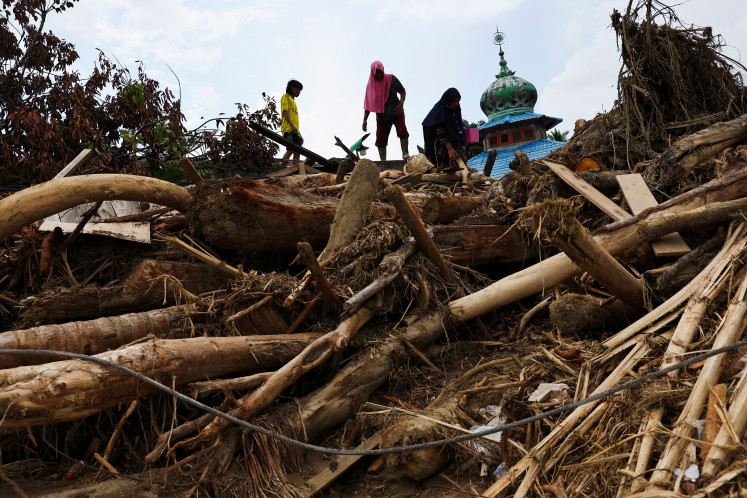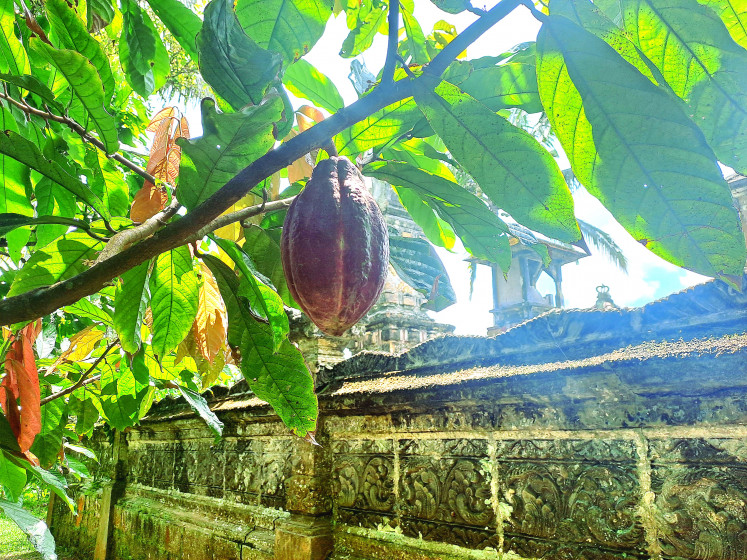Popular Reads
Top Results
Can't find what you're looking for?
View all search resultsPopular Reads
Top Results
Can't find what you're looking for?
View all search resultsDutch govt apologizes for 1947 massacre
Official apology: Dutch Ambassador to Indonesia Tjeerd de Zwaan pays homage by scattering petals on the graves of Indonesia victims of the Dutch massacre in Rawagede, West Java, on Friday
Change text size
Gift Premium Articles
to Anyone
O
span class="caption" style="width: 398px;">Official apology: Dutch Ambassador to Indonesia Tjeerd de Zwaan pays homage by scattering petals on the graves of Indonesia victims of the Dutch massacre in Rawagede, West Java, on Friday. The Dutch government officially apologized to the relatives of the victims on Friday for killing more than 400 people in Rawagede on Dec. 9, 1947The Netherlands has officially apologized to relatives of victims killed in Rawagede village during Indonesia’s struggle to keep its independence more than six decades ago.
Dutch Ambassador to Indonesia Tjeerd de Zwaan presided over a tearful ceremony on Friday, attended by hundreds of villagers including surviving widows in their late 80s and early 90s, to issue an official apology from the Dutch state for its responsibility in the Rawagede Massacre.
“Today, we remember your family members who died 64 years ago at the hands of the Dutch military troops. On behalf of Dutch government, I deeply apologize for the tragedy,” Ambassador de Zwaan said as quoted by Antara in his speech during the ceremony at the Rawagede Heroes Cemetery in Karawang regency, West Java.
About 430 villagers were killed by the Dutch troops on Dec. 9, 1947.
Foreign Minister Marty Natalegawa praised the Dutch government’s apology, hoping surviving relatives would soon be given the compensation.
“It’s an important step that the Dutch government has taken. I hope it can be finished soon so the families of the victims can feel the solution,” he said.
The Rawagede tragedy was taken to trial when nine surviving widows and relatives filed the case with the International Criminal Court in The Hague, the Netherlands.
The court ruled on Sept. 14, 2011, that the Dutch government was guilty and responsible for the massacre, thus should pay compensation to each of the nine relatives.
Liesbeth Zegveld, lawyer for the relatives, said the Dutch government would pay each of them ¤20,000 (US$26,692) compensation.
National Commission on Human Rights (Komnas HAM) official Ifdhal Kasim told The Jakarta Post the Dutch government’s initiative to officially apologize to surviving relatives showed its political will to uphold human rights.
“The Dutch government has admitted its crime by not only submitting to the court’s ruling but also by apologizing to the family members of those who lost their lives in the massacre. The confession is really important to help both parties to sincerely forgive what had happened and move forward,” he said.
Ifdal further hoped the Indonesian government would be inspired by such “noble initiative” and thus show strong commitment to resolve human rights violations taking place all across the country.
“Human rights groups must keep up with their work pushing the government to uphold human rights in this country,” he said.
Haris Azhar, coordinator of human rights watchdog Kontras, said such an initiative would prevent history from being misinterpreted.
“The Dutch government tells the world that the massacre really occurred and that it was responsible by apologizing.”
He added that the Dutch government has also set an example for enforcing human rights in Indonesia.
“The Dutch have taught our government that the state should be responsible for any human rights violations it committed in the past.”
Human rights watchdog Setara Institute’s 2011 report reveals that Indonesia’s human rights index for this year is below standard, at 2.3 on a scale of zero to seven.
Setara recorded unsolved severe human rights violations in the past, such as the 1984 Tanjung Priok massacre, the 1998 Trisakti tragedy and the 1999 Semanggi incident. (msa)










